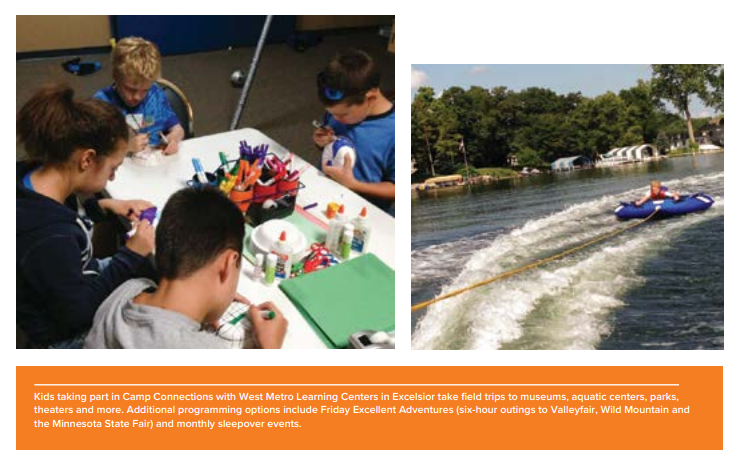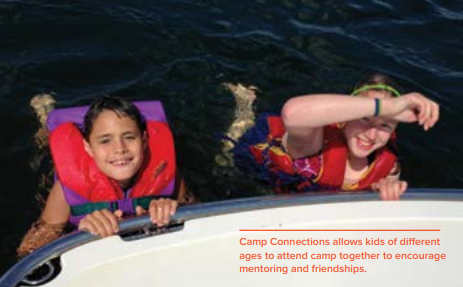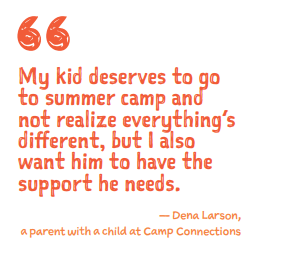Social skills can be hard to master for anyone, and the unwritten rules that prescribe them in our fast-paced culture can be all too easy to miss for some children.
Where should I sit in the cafeteria? What do I do when I get into a fight with one of my friends? What happens when no one seems to be interested in the same things I am?
Those are tough questions — even for kids blessed with exceptionally strong social skills.
Now imagine navigating those murky waters as a kid with special needs.
Making connections
Through West Metro Learning Connections’ year-round social skills classes — and its summer program, Camp Connections (for ages 4 and up) — children dealing with social skills challenges or who are on the autism spectrum can make friends, learn better communication skills and experience the fun of summer camp.
Unlike West Metro’s year-round classes, the day camps — offered at West Metro’s Excelsior location — don’t involve formal lessons in everyday social skills. Instead, the staff work to facilitate and foster an environment of positive reinforcement, peer support and social interaction.
One out of every 68 children is on the autism spectrum, according to the Centers for Disease Control and Prevention.
Children on the autism spectrum are more likely to have social and communication challenges, such as understanding and conveying emotions or finding the right words to express their thoughts.
Beyond autism
Social skill difficulties aren’t exclusive to kids on the autism spectrum, however.
Take, for example, 9-year-old Elliott, an energetic and empathetic kid.
The social skills challenges he faces at home and in school are harder to explain.
For example, he once started self-sabotaging his strategy during a family game night.
His dad was having a rough streak in the board game Blokus. So Elliot started taking turns that made no sense — solely because he was worried his dad would be sad with how poorly he was doing.
Elliott started attending West Metro when he was in preschool, and when he became old enough for summer camp, his mom, Dena Larson, signed him up without hesitation because, “Everyone deserves to go to summer camp.”
And not only has her son learned how to process social situations better, he’s enjoyed camp experiences both academic and recreational.
Attentive counselors
At Camp Connections, every kid goes through a full intake process, which includes a review of medical history and conversations between the camp’s director of educational placement and anyone who’s prominent in the child’s life, such as teachers and parents.
The goal, camp director Carl Weber said, is to understand why kids are doing what they’re doing and to help them improve, whether the focus is transitions, arguing, self-advocacy or something else.
At the end of each day, staff fill out progress-report forms to update parents and to let them know how they can help their kids work on skills at home, too.
Many of West Metro’s staff members are trained in special education, and the camp maintains a minimum 1-to-3 counselor-to-camper is ratio. And because Camp Connections attendees usually sign up for most of the summer, a rapport often builds between the staff and campers.
“It’s clearly a well-chosen and cultivated group of people,” Larson said of the counselors and staff. “They come across as teachers who happen to be camp counselors.”
Larson said she appreciated how every camp counselor, staff member and administrative staff made an effort to get to know her son during camp.
When she would pick him up, they would tell her the details of his bad days, his good days, funny stories and everything in between.
“They know what sorts of things would be particular milestones for him,” she said. “There’s a personal pride with the children’s accomplishments.”
Weber said: “My favorite part is the transformation — from students coming to see me and the staff — to students coming to see their friends.”
Taking trips, making strides
West Metro has helped Elliott control the intensity of his emotional reactions to certain situations.
He’s learned to understand that, just like him, other kids have good and bad days, too.
The program has helped him realize that if someone doesn’t want to play Star Wars with him one day, then he can be flexible enough to decide whether he wants to find someone else or if playing with this particular person matters more.
Before, Larson said, he might have imploded because the ideal picture in his head wasn’t matching up to how real life was playing out.
While he may have learned many of these skills from the year-round curriculum of West Metro’s skills classes, at camp he was able to practice them, day in and day out, with gentle guidance from counselors.
Some summer camps separate groups by age, but Camp Connections does not.
“[The campers] fit well together,” said Mollie Van Arsdale, the social skills coordinator and marketing specialist. “All the kids are very understanding of each other’s strengths and weaknesses.”
Larson said the mix of ages allows campers to be role models while also seeing role models among their peers.
Staff make sure to choose activities — which are built around a single theme each week — that appeal to campers of all ages.
Last summer’s camp was full of visits from experts and field trips to exhibits and other destinations.
That included a visit from a veterinarian (who brought along animals and equipment) and a trip to the University of Minnesota’s astrophysics department.
Weber said the camp tries to balance the outings to be 50 percent academic and 50 percent therapeutic recreation. The result?
“I think we’ve visited every water park in Minnesota,” he joked. That may be true, but trips to places such as the Crayola Experience at the Mall of America and local bowling allies rank pretty high, too.
A la carte
One thing that makes West Metro especially accommodating is that parents can choose specific days and excursions completely a la carte.
Their children could go to Camp Connections a half-day once in a while or go all day, Monday through Thursday for all three summer months.
Summer camp, Larson said, provides a way for families to see if year-round social skills support therapy could be helpful for their children, but without losing the freedom to explore other camps and opportunities that suit their schedules.
When Larson asked her son what he would want people to know about West Metro, he started listing all the places he visited over the summer: “We go on field trips! We go to water parks! We go to museums. We go to the beach!”
“You could put down hundreds of items down for a description of West Metro before he mentions teachers helping him with hard situations with his friends,” Larson said. “That’s exactly what I want camp to be. My kid deserves to go to summer camp and not realize everything’s different, but I also want him to have the support he needs.”
CAMP CONNECTIONS
West Metro Learning Connections offers summer day camps, combining social skills development with therapeutic recreation and field trips for children on the autism spectrum and those with other social, emotional and behavioral needs with activities designed to help kids “fit in and shine.”
Additional programming options include Friday Excellent Adventures, plus monthly sleepovers. Some families use a combination of a social skills therapy group and day camp.
Ages: 4–18
Hours: Full-day camps go from 9–4 p.m. Monday through Thursday, but they can be split into half days or combined with social skills classes. Drop-off begins at 8 a.m., and late pick-up goes until 5 p.m.
Location: 355 Second St., Excelsior
Info: See wmlc.biz or 952-474-0227 Ext. 204 or [email protected]
Lianna Matt is a Twin Cities journalist who loves traveling and meeting people on the job — even if she is a bit directionally challenged.


























